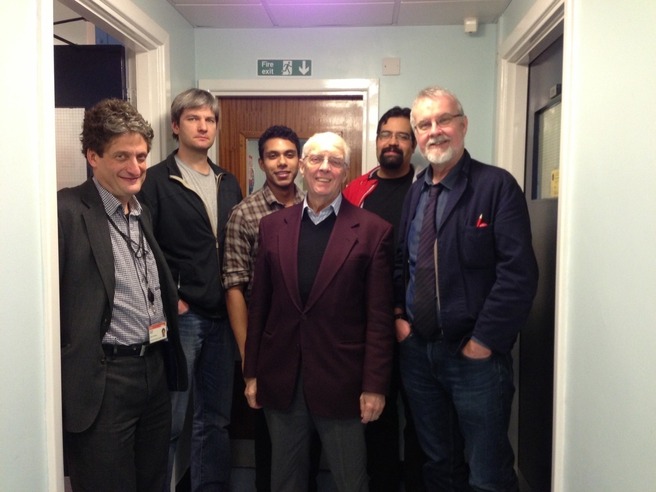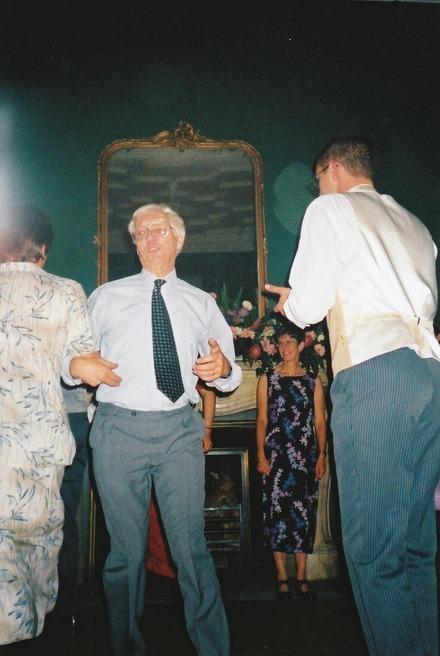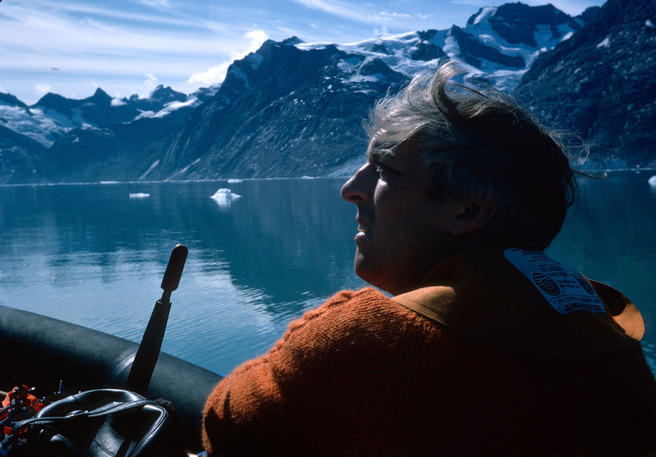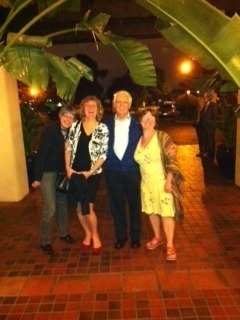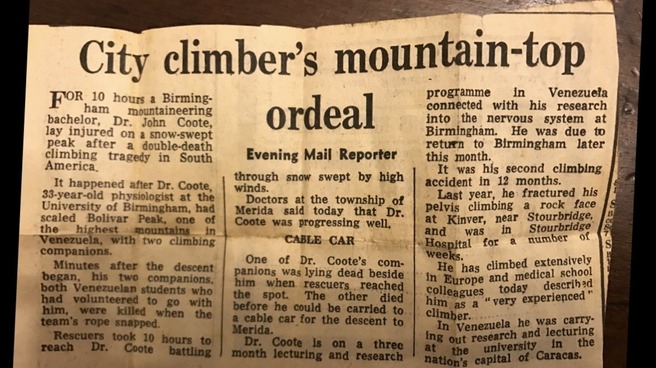The Following was translated by google from the article that appeared in the Venezuelan newpapers at the time, The Birmingham Evening Picked up on this afterwards and a photo of the article has previously been posted by Rachel. If anyone can read Spainish and would like to edit this please let me know,there are some bits which do not read so well
The most important sectors of Merida, especially sports, are today moved by tragic news of the death of the young Jorge Eduardo Burguera, 21 and Jorge Morales, 18, both from Merida, who at that time descended from the Pico Bolivar and accompanied also by British sportsman John Coote, 33 years old, the result with a wound of consideration.
Jorge Eduardo Burguera, a fourth-year engineering student at the University of Los Andes (ULA), and president of the Federation of Andinismo of Venezuela and a member of the centre of hiking and mountaineering of the same institution, was the oldest of the Merida mountaineers. Offering his life in the practice of his favourite sport and in different opportunities, he had been the main driving force of successful days abroad. I participated in an excursion to Ecuador, where the most important summits climbed. He also presided over a similar day in Colombia, which was also successful.
Jorges Morales, younger than Burguera, was also a veteran mountaineer with numerous ascents in the Sierra Nevada. He was a high school student and was preparing to enter the University of the Andes.
The Englishman Coote, came to Merida of sight. but as he does not know the region. He requested help from the Centre for Hiking and Mountaineering of the ULA to ascend the 5007 meters of Pico Bolivar. Burguera and Morales jumped at the chance, as often did, to take the visitor to the highest peak in Venezuela.
In the station of Barinitas of the teleferic they said yesterday before leaving that they would be back in the last hours of the afternoon. The experience of both allowed them to calculate the time it would take as they had ascended successfully on many other occasions .
According to calculations made by compatriots of the two missing young people, the ascent to Pico Bolivar would have been undertaken near noon yesterday.
However, when it was five o'clock in the afternoon, the personnel of the Pico Espejo (teleferic) station, the highest in the system, began to worry and then, a few hours later, declared the three climbers lost.
The manager of the teleferic, Luis Davila Fonseca, was informed of the surprise and immediately arranged the organisation of a mountain rescue team that went out to look for the three athletes. The weather in the Sierra Nevada was totally adverse, because there was excessive cold and it was snowing constantly.
However, at one o'clock in the morning, from Pico Espejo they informed Merida that an accident had occurred and that the young Jorge Eduardo Burguera had died. Jorge Morales, was wounded. He had a broken leg and a head wound. The Englishman Coote, had suffered some injuries, but as he had been able to move had opted to try to find the route to the station of Pico Espejo, but given the novelty of the ground had got lost on route.
It was learned that the accident had occurred because some of the mountaineers who had left early for the Pico Bolivar, found Jorge Morales, to whom they offered all the help they could. They sheltered him and gave him some attention. They could not return to the Pico Espejo, given that time did not allow it.
THE VERSIONS OF THE ACCIDENT
Ali Palacios, a nurse at the service of the teleferic and mountaineer, stated today that the versions that were available were that the accident had taken place at the La Escalera site, about 40 meters from the summit of Pico Bolivar. It is believed, he said, that the rope that held the three athletes, snapped and they all fell into the void, Burguerar’s fall resulted in wounds and fractures that presumably produced the death almost instantaneously. The canyon? was about 70 meters deep, but because of the inaccessibility of the place, the rescue of the corpse could be possible delayed until the morning
Jorge Morales was still alive today and was taken to Pico Espejo, where a team of doctors, including the Rector of the University of Los Ander, Dr. Pedro Rincon Gutierrez, Carlos Chalbaud Zerpa, well-known climber, Enrique Febres, Cardenas Davila and Diego Davilla, paid him due attention. Rector Rincon Gutierrez had called Merida to urgently seek the specialist, Pedro del Corral, because it was believed that there would be a need for a dedicated surgical intervention.
Near midday the news reached Merida of the death of the young Jorge Morales. It was said that he had suffered serious head injuries.
At one in the afternoon, the body of Jorge Morales was brought to this city by a team of climbers and firefighters, there were family members who could not stand the situation and externalized their dollar
Jorge Eduardo Burguera was a veteran of the heights, not only of Merida, but of other countries. Together with other members of the ULA mountaineering club, he had climbed Pico Bolivar an infinite number of times, even because of his northern fiancé. He had also conquered the summits of La Concha, El Humboldt, El Bompland, El Toro, El Leon. It is decaying, practically conquered all the summits of the Sierra Nevada. His father, the well-known merchant of the same name, was surprised because he thought his son was a true veteran in the difficult sport of mountaineering.
not only the relatives of the deceased youth were shocked, but also all the members of the centre of hiking and mountaineering of the ULA. In general, the sport of Merida was today a lute, since both Burguera and Morales were loved, especially in the student sectors, which was their closest world and in which they developed and projected in their main sports activity the mountaineering.
the manager of the teleferic luis davila fonseca and the nurse ali palaces reported this noon that the corpse of Burguera had been rescued and, at about one o'clock in the afternoon, was transferred on the shoulders of firemen and climbers up mirror peak, to bring it there to Merida. Also rescued was the Englishman John Coote, who had gone astray when trying to return to the station of the cable car to give the news and ask for help. the corpse of Burguera was brought at three in the afternoon to merida. The Englishman Coote was taken to the hospital in the Andes.
The last accident that had occurred in the Sierra Nevada, was exactly 19 months ago when also killed the young Maximilian Rangel. On that occasion, Jorge Burguera, his partner of studies and height, participated in the rescue of the Cadavier.


